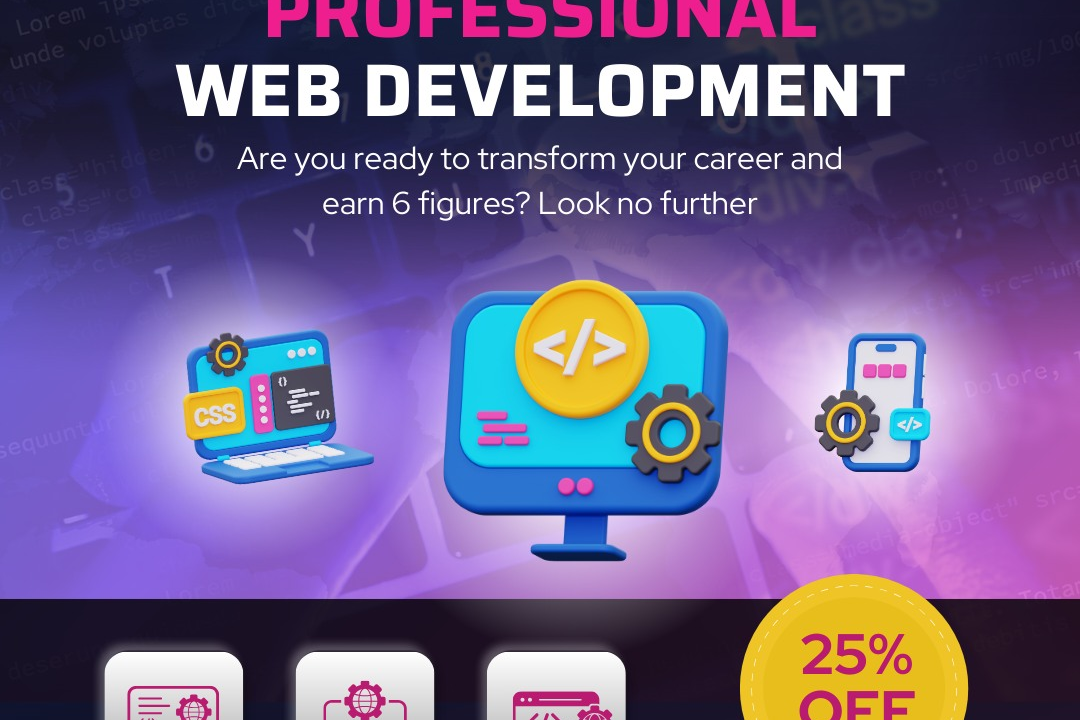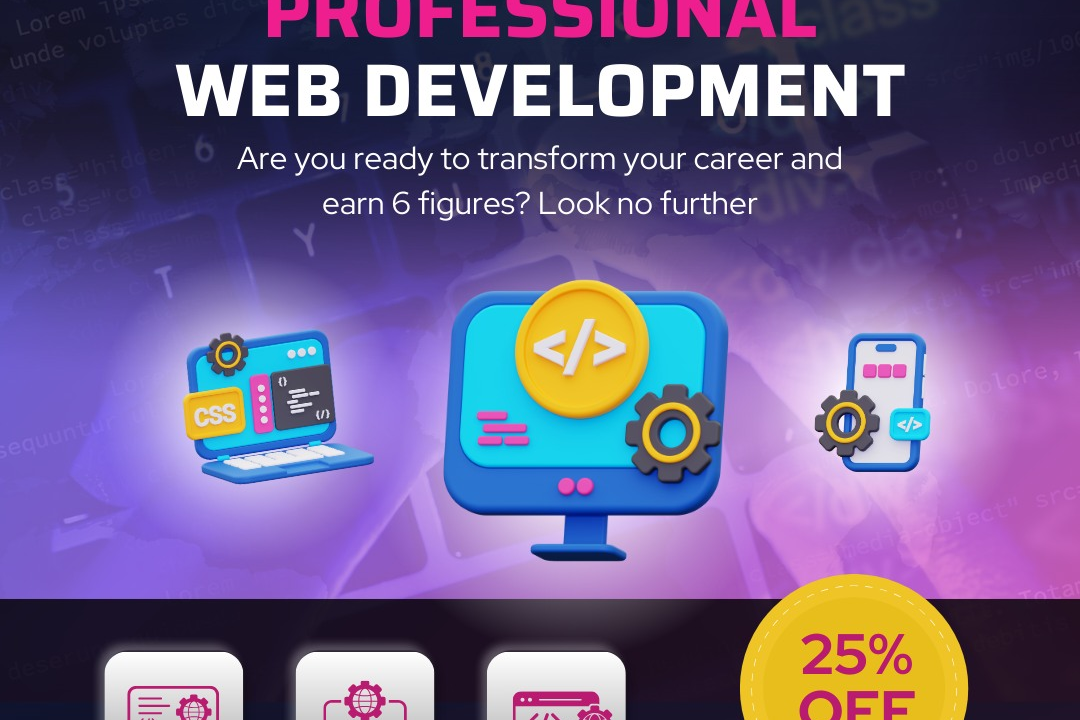Give Me Program On If Else In Php
An if-else program in PHP is a basic control structure used to perform different actions based on wh
Give Me Program On If Else In Php
An if-else statement in PHP is a fundamental programming construct that enables dynamic decision-making within your code, allowing applications to respond differently based on specific conditions. This versatility is essential for creating interactive and user-responsive websites, such as validating user input, customizing content, or controlling access based on certain criteria. By using if-else statements, developers can write more efficient and logical scripts that adapt to various scenarios, enhancing the overall functionality and user experience of PHP-based applications.
To Download Our Brochure: https://www.justacademy.co/download-brochure-for-free
Message us for more information: +91 9987184296
An if else statement in PHP is a fundamental programming construct that enables dynamic decision making within your code, allowing applications to respond differently based on specific conditions. This versatility is essential for creating interactive and user responsive websites, such as validating user input, customizing content, or controlling access based on certain criteria. By using if else statements, developers can write more efficient and logical scripts that adapt to various scenarios, enhancing the overall functionality and user experience of PHP based applications.
Course Overview
The “Give Me Program on If Else in PHP” course offers a concise introduction to conditional statements, teaching how to implement if-else logic in PHP for decision-making and dynamic programming. It covers basic syntax, practical examples, and real-time project applications to help learners understand how to control code flow effectively.
Course Description
This course provides a fundamental understanding of if-else statements in PHP, covering syntax, practical examples, and real-time project applications to help learners implement conditional logic effectively.
Key Features
1 - Comprehensive Tool Coverage: Provides hands-on training with a range of industry-standard testing tools, including Selenium, JIRA, LoadRunner, and TestRail.
2) Practical Exercises: Features real-world exercises and case studies to apply tools in various testing scenarios.
3) Interactive Learning: Includes interactive sessions with industry experts for personalized feedback and guidance.
4) Detailed Tutorials: Offers extensive tutorials and documentation on tool functionalities and best practices.
5) Advanced Techniques: Covers both fundamental and advanced techniques for using testing tools effectively.
6) Data Visualization: Integrates tools for visualizing test metrics and results, enhancing data interpretation and decision-making.
7) Tool Integration: Teaches how to integrate testing tools into the software development lifecycle for streamlined workflows.
8) Project-Based Learning: Focuses on project-based learning to build practical skills and create a portfolio of completed tasks.
9) Career Support: Provides resources and support for applying learned skills to real-world job scenarios, including resume building and interview preparation.
10) Up-to-Date Content: Ensures that course materials reflect the latest industry standards and tool updates.
Benefits of taking our course
Functional Tools
1 - PHP Development Environment: Students utilize integrated development environments (IDEs) such as Visual Studio Code, PHPStorm, or Sublime Text to write, edit, and manage PHP code efficiently. These tools offer syntax highlighting, code completion, and debugging features that streamline the learning process. Setting up a proper development environment is essential for smooth coding and troubleshooting, allowing students to test their if else programs in real time. Familiarity with these tools helps build a strong foundation for professional PHP development, enabling learners to work on complex projects confidently. The environment setup also includes configuring local servers like XAMPP, WAMP, or MAMP to simulate a live server for testing dynamic web applications locally. This hands on approach ensures students understand the practical aspects of PHP coding and prepares them for real industry scenarios by providing a seamless development experience. It promotes efficient coding practices, reduces errors, and encourages experimentation, all crucial for mastering conditional programming constructs like if else statements.
2) Web Browser: Modern browsers such as Chrome, Firefox, Edge, or Safari are essential tools for executing and testing PHP scripts. Since PHP code runs on the server, students use browsers to view the output transmitted from the local server or web host. This allows for immediate visual feedback on how conditional statements influence webpage behavior or logic flow. Browsers also offer tools like developer consoles to assist in debugging and inspecting webpage elements, which is useful when integrating PHP with front end components. The real time rendering helps students understand the impact of if else conditions on user interactions and webpage dynamics, making the learning experience more interactive. By utilizing multiple browsers, learners can test cross browser compatibility and ensure their PHP applications work consistently across different environments, which is vital in real world web development.
3) PHP Server Software: Tools such as XAMPP, WAMP, or MAMP function as local servers that enable students to run PHP scripts on their computers without needing an internet connection. These packages contain Apache, MySQL, PHP, and phpMyAdmin, creating a complete development environment. Students install and configure these software packages to simulate live server environments, allowing them to test their if else code snippets effectively. This setup is crucial for understanding server side scripting and executing PHP code as it would function on an actual web hosting platform. The use of server software helps students grasp concepts related to server configuration, file management, and debugging, providing a comprehensive practical experience. Working within these environments also exposes learners to common issues faced during deployment and how to resolve them efficiently, thus preparing them for professional development roles.
4) Text Editors: Besides IDEs, simple text editors such as Notepad++, Sublime Text, or Atom are also used to write PHP code. These lightweight tools support syntax highlighting, code snippets, and basic debugging features, making them suitable for beginners or quick testing. Students benefit from understanding how to configure and utilize these editors as they offer flexibility and simplicity for learning core PHP syntax and logic. They serve as an excellent starting point for writing PHP if else programs, particularly when learning fundamental programming concepts. The familiarity with different coding editors enables students to choose the most efficient tools for their workflow, enhancing productivity and comfort during coding sessions. Additionally, these editors often support plugin integrations that further aid in debugging and code management, essential skills for aspiring PHP developers.
5) Version Control Systems (VCS): Git and platforms like GitHub or GitLab are important tools used for managing code versions and collaborative development. Students learn to track changes, revert to previous versions, and collaborate on PHP projects involving conditional programming. Using version control promotes good coding practices, enables effective teamwork, and prepares students for industry standard workflows. By maintaining their if else code snippets in repositories, learners can document their progress, experiment with different versions, and participate in code reviews. This fosters a disciplined approach to programming and enhances problem solving capabilities. Integrating VCS tools into the training program ensures students understand the importance of maintaining code integrity and facilitates real world collaboration scenarios in advanced stages of their learning journey.
6) Debugging and Testing Tools: Tools like Xdebug, PHP Debug Bar, and built in IDE debugging features are crucial for analyzing and troubleshooting PHP code, especially conditional statements. These tools allow students to set breakpoints, step through code execution, and inspect variable states at different stages. Debugging is an essential skill for identifying logical errors in if else structures and ensuring the program behaves as expected. Using these tools deepens students’ understanding of program flow and helps them develop analytical skills for problem solving. Besides, testing tools such as PHPUnit enable students to write automated tests for their PHP scripts, ensuring reliability and correctness of their code under various conditions. Incorporating these tools into the course encourages best practices in software quality assurance, ultimately producing proficient PHP developers equipped to handle complex projects effectively.
7) Database Management Tools: Platforms like phpMyAdmin, MySQL Workbench, and Sequel Pro are integral for managing and interacting with databases in PHP projects. Students learn to create, modify, and query databases to store dynamic content, user information, or application data. Understanding how PHP interacts with databases using conditional logic to fetch, insert, update, or delete records enhances their ability to develop data driven web applications. Hands on experience with these tools helps students understand SQL commands, manage database connections, and troubleshoot data related issues, which are common in real world projects involving conditional data processing.
8) Learning Management Systems (LMS) Integration: Platforms like Moodle or Canvas are used to deliver PHP course content, assignments, and interactive quizzes. Incorporating LMS tools allows students to submit their code, receive feedback, and track progress efficiently. These systems also facilitate peer reviews and collaborative learning, which enrich the educational experience. Integration with PHP courses ensures students develop skills in deploying PHP based LMS modules and managing server side logic for educational content delivery and condition based access controls, mirroring real world e learning website development.
9) Cloud Deployment Platforms: Services such as Heroku, AWS Elastic Beanstalk, or DigitalOcean enable students to deploy their PHP applications online for broader testing and showcase. Learning to deploy PHP projects in the cloud helps students understand web hosting, scalability, and environment setup. Working with cloud platforms exposes students to best practices in deployment automation, security configurations, and performance optimization, especially when applying conditional logic for feature toggles or user specific content delivery.
10) API Testing Tools: Tools such as Postman, Insomnia, or Paw allow students to test and debug APIs integrated within PHP applications. Many real world PHP projects involve consuming or creating RESTful APIs where conditional logic determines responses and access levels. Familiarity with these testing tools helps learners simulate various request scenarios, validate responses, and ensure their PHP code handles different conditions appropriately in API communications.
11 - Learning Resources and Documentation Platforms: Subscription to platforms like Stack Overflow, W3Schools, PHP.net, or developer forums supports continuous learning and problem solving. Students can seek solutions for specific conditional programming challenges, best practices, or troubleshooting advice. Navigating comprehensive documentation enhances their understanding of complex PHP features and keeps them updated with latest standards and security practices related to conditional scripting.
12) Animation & Front End Integration Tools: Basic knowledge of front end frameworks like Bootstrap or libraries such as jQuery aids in creating interactive interfaces that respond dynamically based on PHP conditionals. This integration helps students visualize how server side PHP logic affects client side behavior, enriching their full stack development skills. Using these tools, students can build conditional UI components, real time notifications, or personalized user experiences.
13) Continuous Integration / Continuous Deployment (CI/CD) Pipelines: Platforms like Jenkins, Travis CI, or GitHub Actions help automate testing, deployment, and code integration processes. Students learn to set up automated workflows that validate their PHP code—particularly conditional logic—before deployment. This reinforces good development practices, ensures code quality, and prepares students for rapid development cycles in professional environments.
14) Security Testing and Analysis Tools: Using tools like OWASP ZAP, Burp Suite, or PHP Security Scanner, students examine their code for vulnerabilities related to conditional statements, such as injection flaws or logic bypasses. Understanding security best practices ensures their PHP applications are robust and trustworthy, especially when dealing with condition based access control or data validation.
15) Online Code Sharing and Collaboration Platforms: Replit, CodePen, or JSFiddle, adapted for PHP, provide collaborative coding environments where students can share their if else programs, receive peer feedback, and work on joint projects in real time. These platforms foster a community learning atmosphere, encouraging experimentation and collective problem solving.
Harnessing these tools and platforms gives students comprehensive exposure to the ecosystem surrounding PHP development. They facilitate a practical, hands on learning experience that combines coding, debugging, deployment, and collaboration—essential skills for a successful career in web development with PHP and related technologies.
Browse our course links : https://www.justacademy.co/all-courses
To Join our FREE DEMO Session:
This information is sourced from JustAcademy
Contact Info:
Roshan Chaturvedi
Message us on Whatsapp: +91 9987184296
Email id: info@justacademy.co
Top 10 Institutes Offering Mobile App Testing Using Appium Training Courses With Job Assistance In M












